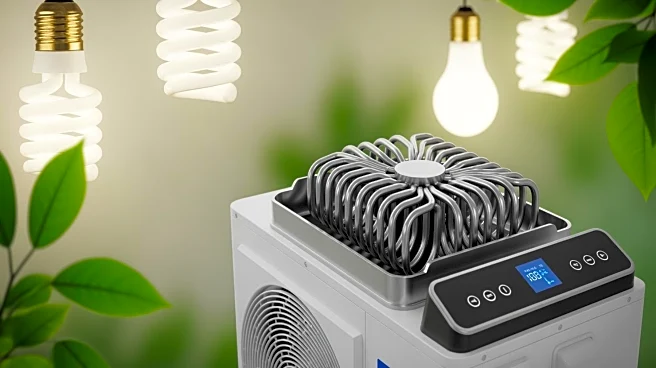What's Happening?
Heat pumps are emerging as a highly efficient solution for heating and cooling homes, with the ability to achieve more than 100% efficiency under certain conditions. This efficiency is measured by the coefficient
of performance (COP), which can range from 200% to 400%, meaning the system delivers more energy than it consumes. Unlike traditional fossil-fuel systems, which generate heat by burning gas, heat pumps move heat from outside to inside, requiring less energy input. This technology is particularly beneficial in mild weather conditions, where external heat is more readily available, reducing the workload on the system. The efficiency of heat pumps can drop in extreme cold, but newer models are designed to maintain performance even at lower temperatures.
Why It's Important?
The high efficiency of heat pumps can lead to significant reductions in utility bills for consumers, as less energy is required to maintain comfortable indoor temperatures. This technology also supports environmental goals by reducing reliance on fossil fuels and lowering greenhouse gas emissions. As the U.S. moves towards stricter efficiency standards for heating systems, heat pumps offer a viable alternative to traditional gas furnaces, which are set to face higher efficiency requirements by 2028. The adoption of heat pumps aligns with broader efforts to transition to cleaner energy sources and improve energy efficiency in residential settings.
What's Next?
As the demand for energy-efficient solutions grows, manufacturers are likely to continue innovating heat pump technology to enhance performance in various climates. The U.S. Department of Energy's upcoming efficiency standards for furnaces may accelerate the shift towards heat pumps, prompting further investment in research and development. Consumers may increasingly consider heat pumps as a cost-effective and environmentally friendly option for home heating and cooling, especially in regions with favorable electricity prices compared to gas.
Beyond the Headlines
The transition to heat pumps represents a shift in consumer behavior towards more sustainable energy solutions. This change may influence the market dynamics for HVAC systems, encouraging competition and innovation among manufacturers. Additionally, the widespread adoption of heat pumps could contribute to the U.S.'s climate goals by reducing overall energy consumption and emissions.








